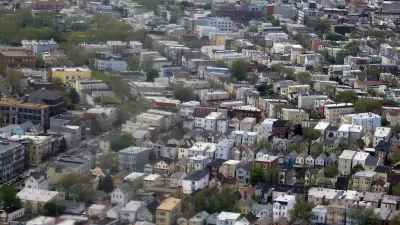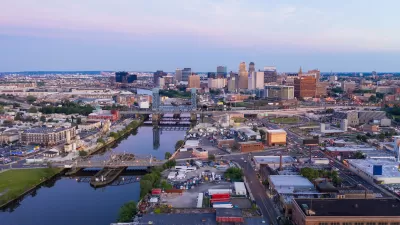Beset by a large budget deficit and overwhelming poverty, Newark's local government services director has warned that the city might require state supervision.
Siddhartha Mitter reports that Newark's financial situation has prompted Local Government Services Director Tom Neff to advise new mayor Luis Quintana that the city might need to be placed under state supervision.
The specter of Detroit's bankruptcy situation is influencing Newark's mayoral election (election day is May 13). Writes Mitter: "While fear of becoming another Detroit has become commonplace in urban political rhetoric, Newark loosely shares enough traits with the Michigan metropolis — the spiral of disinvestment, middle-class flight, violence, poverty, a majority African-American population under strain — for the possibility to carry weight. Views differ, however, on just what it means to become another Detroit, let alone how to prevent it."
Good news connected to recent state-subsidized development have been offset by lots of bad news, including a scandal involving Newark Watershed, the agency that oversees sewer and water, and a $40 million budget deficit. "These concerns come on top of Newark’s chronic problems, which a series of big-ticket downtown developments and state-subsidized corporate relocations have not managed to blunt. Nearly one-third of its population and more than 43 percent of its children live below the poverty line. Its high school graduation rate is 68 percent. There were 111 murders there in 2013 — the most since 1990 and a shocking number in a city of 280,000 people."
FULL STORY: In the Battle for Newark, Fears of Becoming the Next Detroit

Study: Maui’s Plan to Convert Vacation Rentals to Long-Term Housing Could Cause Nearly $1 Billion Economic Loss
The plan would reduce visitor accommodation by 25,% resulting in 1,900 jobs lost.

North Texas Transit Leaders Tout Benefits of TOD for Growing Region
At a summit focused on transit-oriented development, policymakers discussed how North Texas’ expanded light rail system can serve as a tool for economic growth.

Why Should We Subsidize Public Transportation?
Many public transit agencies face financial stress due to rising costs, declining fare revenue, and declining subsidies. Transit advocates must provide a strong business case for increasing public transit funding.

How to Make US Trains Faster
Changes to boarding platforms and a switch to electric trains could improve U.S. passenger rail service without the added cost of high-speed rail.

Columbia’s Revitalized ‘Loop’ Is a Hub for Local Entrepreneurs
A focus on small businesses is helping a commercial corridor in Columbia, Missouri thrive.

Invasive Insect Threatens Minnesota’s Ash Forests
The Emerald Ash Borer is a rapidly spreading invasive pest threatening Minnesota’s ash trees, and homeowners are encouraged to plant diverse replacement species, avoid moving ash firewood, and monitor for signs of infestation.
Urban Design for Planners 1: Software Tools
This six-course series explores essential urban design concepts using open source software and equips planners with the tools they need to participate fully in the urban design process.
Planning for Universal Design
Learn the tools for implementing Universal Design in planning regulations.
City of Santa Clarita
Ascent Environmental
Institute for Housing and Urban Development Studies (IHS)
City of Grandview
Harvard GSD Executive Education
Toledo-Lucas County Plan Commissions
Salt Lake City
NYU Wagner Graduate School of Public Service





























